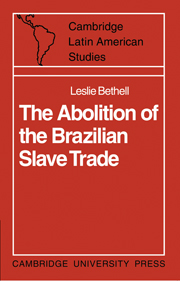Book contents
- Frontmatter
- Contents
- Preface
- Maps
- Abbreviations
- 1 First steps towards abolition, 1807–1822
- 2 Independence and abolition, 1822–1826
- 3 Brazil and the slave trade, 1827–1839
- 4 Treaty negotiations, 1830–1839
- 5 The British navy and the mixed commissions, 1830–1839
- 6 The extension of Britain's powers, 1839
- 7 Britain and the slave trade, 1839–1845
- 8 Slave trade, slavery and sugar duties, 1839–1844
- 9 Lord Aberdeen's Act of 1845
- 10 The aftermath of the Aberdeen Act
- 11 Changing attitudes and plans of action, 1845–1850
- 12 Crisis and final abolition, 1850–1851
- 13 The aftermath of abolition
- Appendix: Estimates of slaves imported into Brazil, 1831–1855
- Bibliography
- Index
8 - Slave trade, slavery and sugar duties, 1839–1844
Published online by Cambridge University Press: 04 August 2010
- Frontmatter
- Contents
- Preface
- Maps
- Abbreviations
- 1 First steps towards abolition, 1807–1822
- 2 Independence and abolition, 1822–1826
- 3 Brazil and the slave trade, 1827–1839
- 4 Treaty negotiations, 1830–1839
- 5 The British navy and the mixed commissions, 1830–1839
- 6 The extension of Britain's powers, 1839
- 7 Britain and the slave trade, 1839–1845
- 8 Slave trade, slavery and sugar duties, 1839–1844
- 9 Lord Aberdeen's Act of 1845
- 10 The aftermath of the Aberdeen Act
- 11 Changing attitudes and plans of action, 1845–1850
- 12 Crisis and final abolition, 1850–1851
- 13 The aftermath of abolition
- Appendix: Estimates of slaves imported into Brazil, 1831–1855
- Bibliography
- Index
Summary
Throughout the period 1839–44 the British government persisted in their efforts, which already went back more than a decade, to strengthen the Anglo-Brazilian anti-slave trade treaty of 1826. In 1839 it had seemed as though the stalemate which had arisen from the refusal of the Brazilian Chamber of Deputies to ratify the additional equipment and break-up articles signed by Henry Fox and Manuel Alves Branco in July 1835, and vital to any effective British preventive system, had at last been broken: British commissary judges in Rio de Janeiro and Freetown, eventually supported by the British government, had reinterpreted the treaty as it stood and argued that British warships already had the right to search and capture Brazilian vessels suspected of intending to trade in slaves. Successive Brazilian governments, however, refused to accept the validity of the British reinterpretation of the treaty. As a result, disputes over the legality of British captures were endemic in both the Anglo-Brazilian mixed commissions, and British naval officers could never rely with any confidence on the condemnation of their prizes. It was a thoroughly unsatisfactory state of affairs and, while ever the British government was reluctant to resort to the kind of measures which had been taken against the Portuguese slave trade (including the adjudication of prizes by British admiralty courts), one which could only be remedied by agreement with Brazil.
- Type
- Chapter
- Information
- The Abolition of the Brazilian Slave TradeBritain, Brazil and the Slave Trade Question, pp. 214 - 241Publisher: Cambridge University PressPrint publication year: 1970



